KATHMANDU, July 6: On June 23, school students rejoiced after scoring well in their Secondary Education Exams (SEE). However, apart from joy, it also has brought confusion among students and their parents, both of whom are pinning hopes to find a ‘good school’.
Meena Thapa, a parent, is in a dilemma. As much as she wants to send her son to a good and renowned school, she also is concerned about affordability. “I want my son to go to a renowned school that is affordable,” Thapa said.
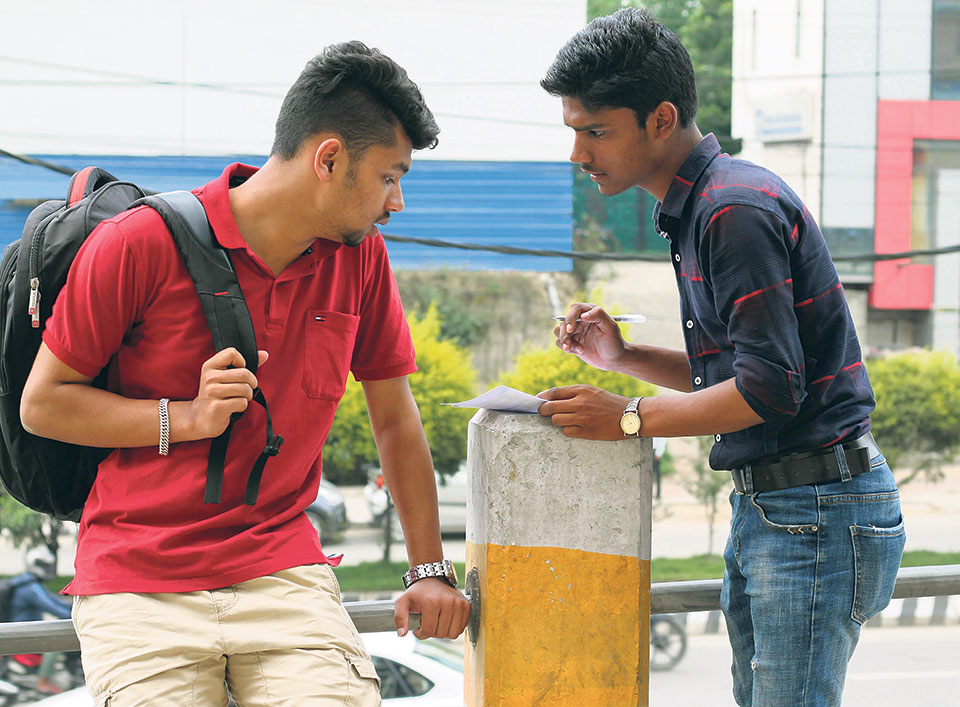
Photo Courtesy: Shahin Sunuwar Rasaili/ Republica
Her son, on the other hand, wants to join a college that focuses not just on academics but also on sports. “I want to go to a college where there’s good sports facility and where teaching is more practical,” Kritartha said adding that he was looking into newspaper advertisements and following up with colleges to find the right one. (Scroll down for useful tips to help you decide)
While parents largely agree to send their children to good schools, the term itself is subjective. However, a common consensus includes affordability, academics and learning environment.
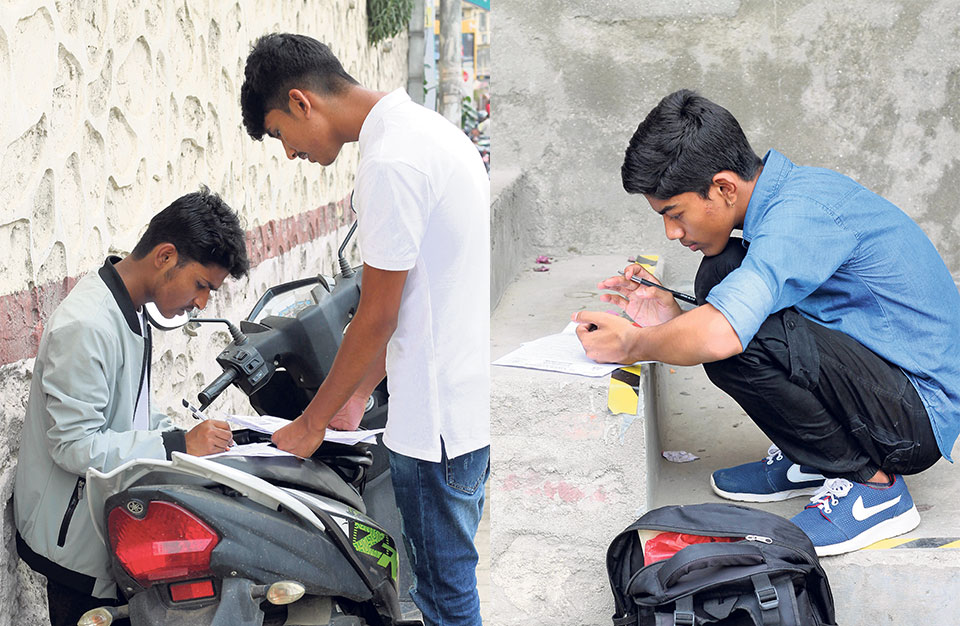
Photo Courtesy: Shahin Sunuwar Rasaili/ Republica
Confusions persist: With the completion of SEE exams, schools have filled newspapers and television advertisements as they boast their salient features. In addition to this, word-of-mouth referrals to colleges also affect a parent’s decision, all of which have collectively affected their choices, despite a clear intent to do otherwise.
Studies have shown that advertisements hit the hardest when the audience are either under pressure or are completely relaxed. To lure its audience, advertisements deploy numerous manipulative tactics.
“Advertisements are seen every day, whether it’s on a web page, before a movie, or in the middle of a TV show, and it's easy to say "they're just ads" because, at worst, they feel like a nuisance or interruption. A lot of people have difficulty accepting the idea that ads are manipulative because we want to believe we're in complete control of our choices,” Adam Dachis, a marketing expert said.
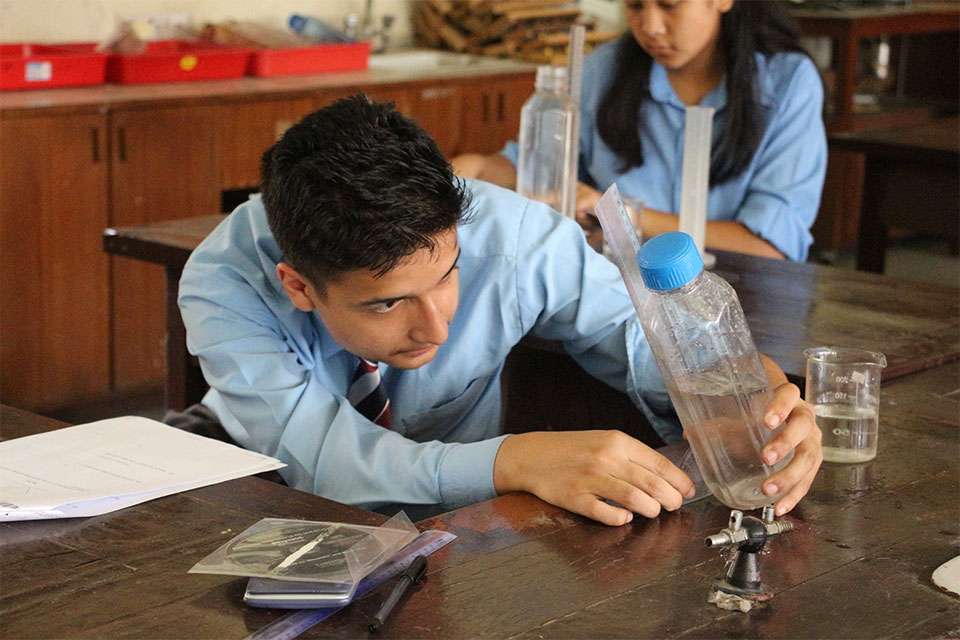
Photo Coutesy: Budhanilkantha School/ Facebook
This, however is not the case as “these memories are created because an ad succeeds at making us feel something-whether it’s good or bad-and that emotional response can have a profound effect on how we think and the choices we make,” Dachis said.
This holds true: every year, schools deploy extensive marketing campaigns during new academic sessions, from education fairs to advertisements endorsed by ‘brand ambassadors’. Such marketing strategies tend to work for most of the time as parents and children eventually end up choosing colleges that are largely repeated.
“I was weighing between DAV, St. Lawrence and Little Angels,” Manisha Thapa who completed her SEE this year from Insight Vision School, Dhumbarahi said. “Eventually, I decided to opt for Little Angels because I saw many advertisements on the front pages of various newspapers.”
However, Purushottam Maharjan, principal of St. Lawrence College, Chabahil argued advertisement impacts were minimal as students are parents primarily focused on first hand exposure through interactions. “We advertise to inform prospective students about admission dates and school’s location,” Maharjan said adding that students now were more proactive as they self evaluated the college, its teaching learning methods and assessed infrastructures.
“Advertisements gives a choice but does not manipulate future students and their interests,” he added.
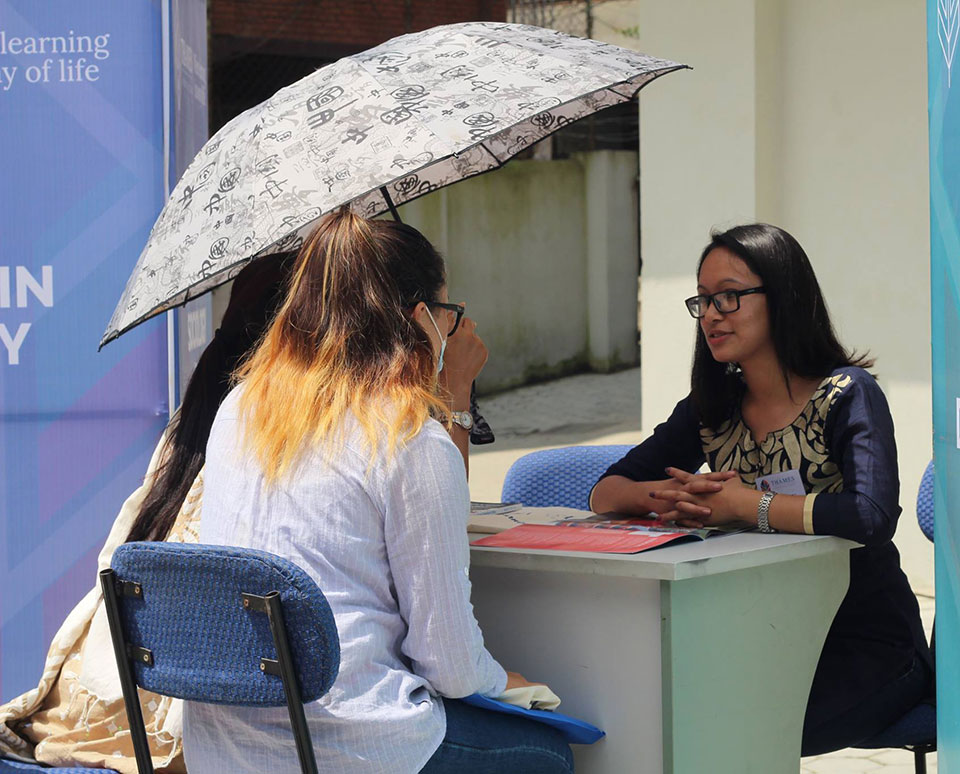
Photo Coutesy: Thames College/ Facebook
For Manju Dawadi, a good school ideally has good environment to foster exchange of ideas and harness learning. “It also has to be affordable because not everyone can pay bulky fees,” she said. Duwadi agrees but adds another key feature: practical learning approaches.
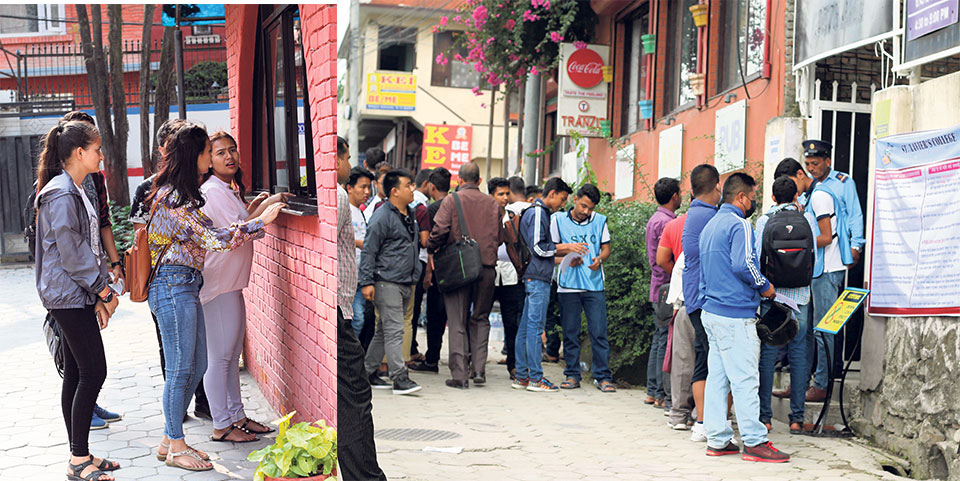
Photo Courtesy: Shahin Sunuwar Rasaili/ Republica
Manju’s son, Ajay echoed in unison as he also sought the same amenities. “Right now, I’m planning to study either in St. Xavier’s, Trinity, Kathmandu Model College, Prasadi or Uniglobe,” Ajay said.
CHOOSING THE RIGHT SCHOOL (Agencies)
Consider your child & your family
Start your search for the best school by thinking about what you want a school to do for your child. Perhaps your child has special language or education needs. Keep these in mind. After all, you know your son or daughter better than anyone else does.
Your child's needs
Does your child need a more structured environment?
Does your child need a less structured environment?
Does your child need more challenging work?
Does your child need more individual attention?
Does your child generally need extra help or more time to complete an assignment?
Does your child have any special learning needs?
Does your child need an environment that fosters creativity?
Does your child need an English language acquisition program?
Your child's learning style
Does your child learn best by seeing how things work?
Does your child learn best by reading about how something works?
Does your child learn best by listening?
Does your child like to participate in discussions?
Does your child like to learn through physical activity?
Is your child logical or mathematical?
Is your child musical or artistic?
Does your child like to learn in groups?
Does your child like to work alone?
Location of school
Do you want your child to go to a school within walking distance of your home?
Can your child's talents be nurtured outside your neighborhood?
Pathways World School, India hosts alumni meet and introductory...

How far are you willing to have your child bused?
How far are you willing to drive your child to school?
Does your child want to be in a school with his or her friends?
Does your child have any special transportation needs that must be considered in choosing a school?
Gather information about schools
Curriculum
Does the school have a strong program of core academic subjects?
What courses does the school offer in addition to the core subjects?
What evidence is there that the school is effectively teaching students to read?
Does the school have a special focus or theme for the curriculum?
Does the school provide enrichment opportunities for all students? For gifted students?
Does the school have extracurricular activities that support what is taught?
If your child has special learning needs, does the school have a curriculum and the necessary supports to appropriately accommodate those needs?
Approach to learning
Does the school have a particular approach to teaching and learning (e.g., group projects, individual performance, frequent testing)?
If yes, do you think your child will enjoy and learn from this approach?
Does the school do all it can to make sure each child learns? Does it provide opportunities for children to get extra help when they need it?
Is the school staff able to communicate in the language that your child understands?
Are children with limited English language skills, learning disabilities, or other special needs learning and performing well on tests?
What is the homework policy? Does it match your expectations for how much homework your child should do?
Do you want your child to go to a singlesex (all-boy or all-girl) school, or a coeducational school?
How large are the classes?
Academic performance
How do the school's test scores compare to those of other schools?
In the past few years, have test scores risen or declined?
How does the school explain the rise or decline? How well have children similar to yours performed on these tests?
How do students moving on to the next level of schooling perform in their new schools?
How many students leave the school before completing the last grade?
What special achievements or recognition has the school received?
Behavior policy
What does the school do to help develop character and citizenship?
What is the discipline policy? How does the school handle students who misbehave?
Are teachers fair in their responses to students? Does the school have a program and supports to prevent and address behavior problems?
Are students allowed to leave school by themselves?
What measures has the school taken to ensure safety? What security measures are in place?
What is the policy on school absences? How does the school encourage daily attendance?
Do school personnel call parents when students are absent?
Does the school have a drug and alcohol abuse prevention program?
Does the school have a dress code?
Do students wear uniforms?
Safety
Is the school safe?
How does the school prevent and handle problems with drugs, alcohol, and tobacco?
How does the school prevent and handle violence, bullying, harassment, and other forms of abusive behavior?
What measures does the school take to ensure safety? What security measures are in place?
What is the school's relationship with the local police?
Is there a police officer on duty during school hours and for extracurricular activities?
What information is available on serious crime in the school?
What information is available on students bringing weapons to school?
Does the school have an emergency plan for local and national emergencies?
What does the school do to ensure that parents and all school administrators know the emergency plan?
Are there drills?
How does the school notify parents about emergency closings? How does the school communicate with parents in other languages?
Special offerings
What extracurricular activities does the school offer after school or on weekends?
Do all students have the opportunity to participate in extracurricular activities?
What interscholastic activities are available to students?
What intramural activities are available to students?
What activities receive the most attention and resources?
Are there school and student publications?
Does the school sponsor field trips?
Are they available to all students?
Are publications for parents available in other languages?
Facilities and services
Is there a well-stocked library where students can check out books and do research? Are reading materials available in other languages?
Is there interlibrary loan?
Is time provided in the day for students to go to the library?
Do students have access to computers and to the Internet in the classroom and library?
Is use of the Internet monitored?
Is there an auditorium or a large room for school assemblies?
Is a school nurse on duty daily?
Is there a cafeteria, and does the school offer a nutritionally well-balanced lunch program? Breakfast program?
Is supervised before- and afterschool care offered?
Are there tutoring programs?
Are counseling services available to students?
Is the school accessible to children with mobility limitations?
Additional questions about private schools
What is the tuition?
Is there a payment plan?
Is there a sliding scale for tuition?
What are the other fees and expenses (room and board, uniforms, books, transportation, lab and computer fees, activity fees)?
What scholarships and loans are available?
Visit and observe schools
Contact the schools you are interested in and make an appointment for a visit. If possible, tour the schools during regular school hours and visit a few classes. Avoid visiting schools during the first or last week of a term in order to get a realistic sense of how the school operates.
Listen closely to what teachers say about the school. The teachers will be the adults closest to your child, and you will want to know if they are well prepared, dedicated, and happy in their work.
Culture
Is the school’s environment helpful and friendly?
Is the school orderly and neat?
What do the bulletin boards look like?
How is student work displayed?
How does the school communicate with students and parents (weekly/monthly newsletter, e-mail, Web site)?
Do the students appear to be courteous, happy, and disciplined?
Is there a welcoming attitude toward all parents?
How are the students with diverse learning needs (e.g., students with disabilities and students with limited English proficiency) treated?
Do the teachers appear to be helpful and friendly?
Principal
What is the principal's philosophy about education?
What is the principal's attitude toward discipline?
In what extracurricular activities is the principal most interested?
What is the principal's reputation in the community?
Is the principal usually at the school and available to talk to parents?
Does the principal get to know the students?
How often does the principal observe teachers?
What does the school do to keep good teachers and improve teacher performance?
How does the principal respond to parental concerns/complaints?
What is the principal's attitude toward students with diverse learning needs (e.g., students with disabilities and students with limited English proficiency)?
According to the principal, what are the school's strengths?
According to the principal, what are the school's weaknesses?
According to the principal, where can the school improve?
Teachers
How do teachers grade student work?
Do teachers have high expectations for all students to achieve to high academic standards?
How do teachers inform students of their expectations?
Do teachers share the course content and objectives with parents?
When and how frequently are teachers available for parent conferences?
Do teachers assign homework? Is it rigorous? Frequent? Sufficient?
Are the teachers highly qualified to teach in their subject areas (do they know the subjects they are teaching)?
Do teachers have the skills and knowledge to address students with special learning needs?
Are specialized staffs available to address the special learning needs of a child (e.g., speech therapist, psychologist or aides)?
Do the teachers know the individual students in their classes?
Are teachers willing to provide extra help to students?
What is the school's policy regarding teacher response to parent inquiries?
Do teachers have websites with class notes and other information for students and parents?
Students
What is the attendance rate for students?
What do students say about the principal?
What do students say about the teachers?
Do the students have school spirit?
What do students say about homework?
Do students participate in and enjoy field trips?
Do students feel safe and secure at the school?
What do student publications say?
What else do students say about the school?
Parent and community involvement
How does the school encourage parental involvement?
What are the ways parents can get involved?
Are parents encouraged to volunteer?
Does the school have an active parent- teacher organization?
Does the school hold meetings and events at times when parents can attend?
Are families expected to be involved with homework?
How frequently does the school communicate with parents?
Are community leaders involved with the school?
Does the school partner with local businesses and organizations?
Are parents involved in the development of school policies?
Reputation
How is the school regarded in the community?
How is the school viewed by other parents?
Is the school respected by other schools, particularly those that receive its students (when they move to the next level)?
Has the school won any awards?
Do people move to the community to go to the school?
What do the graduates of the school say?
Have graduates from the school made significant contributions to the community and their field of choice?
Step 4: Apply to the schools you choose
Once you select the school(s) that you think will be best for your child, you will go through a process of applying to a school (or schools) of your choice and enrolling your child. Consider applying to more than one school, in case your child is not admitted to their first choice.

































